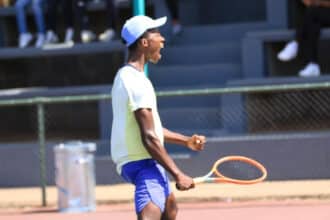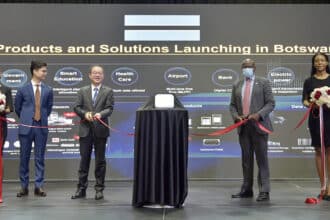At her lowest point, Lebani Tapiwa Mazhani could not open her mouth.
Unable to eat solid foods, the Francistown native survived on a drip for months as she underwent intensive treatment for salivary gland cancer.
Despite the pain and discomfort, Mazhani refused to let the disease derail her ambitions and, whilst receiving treatment, she continued her studies, completing her Law Degree at the University of Botswana (UB).
After two years of medical care, including surgery on her mouth and neck, chemotherapy and radiation, Mazhani received her first clear scan in October 2017.
Since then the 29-year-old has become a figure of hope to those diagnosed with cancer, spreading her inspirational message across Botswana.
She is also the author of ‘Facing Cancer From Under A Mask’, a moving autobiography documenting her battle against the disease.
The multi-talented activist also hosted a talk show on GabzFM, where she interacted with patients, caregivers, doctors and other stakeholders in relation to cancer treatment and management.
Recently, she was announced as one of the Chevening Scholars and will study LLM (Medical Law and Ethics) at the University of Kent in Canterbury, UK.
The Voice’s PORTIA MLILO caught up with this remarkable young woman to talk about her journey to date and the adventure she is about to embark on.
Q. How did you realize that you had salivary gland cancer? What were the symptoms?
I had a small growth at the back of my mouth for some time, but I didn’t pay attention to it because it had no pain and it wasn’t really growing.
My mother is a dentist and one day she looked inside my mouth. She is the one who thought it looked suspicious and my parents immediately started taking me to doctors.
I was officially diagnosed three weeks after that, in July 2014.
Q. How did you deal with such a devastating diagnosis?
I honestly don’t remember my initial reaction.
I think I must have numbed out that memory!
I do know that a few hours later when I was back home from the hospital, I hugged my parents and broke down.
I cried a lot, but eventually, I had to gather my strength because we had lots of work to do. Treatment was due to begin immediately.
Q. Mentally, how did you survive the doom and gloom that surrounds cancer?
Books and the right Internet sources.
Plus I really trusted my doctors, I didn’t need to listen to any other sources of information.
I also spoke to a survivor who reassured me that there were good chances of survival if I stuck to the treatment plan.
Q. What motivated you to go public with your experience?
I met a young man named Mpho Mogomotsi who was struggling with his cancer diagnosis.
I was referred to him to motivate him.
As I continued to learn his story, I understood that a lot of patients and families really didn’t know where to turn to for support and information.
That is when I was compelled to share my story and try to be that support for some.
Q. And what impact do you think your motivational talks have had?
I think the most important thing was that I was challenging the stigma associated with having cancer.
By speaking openly about my condition, I was showing that it could happen to anyone and that there was nothing to be ashamed of.
A lot of people don’t go for treatment because of fear.
My motivational talks spoke openly about cancer, without fear.
Q. You even wrote a book documenting your experience…..
I was repeating my story often.
I thought it would be effective to put it in writing so it can be accessed, even by those I couldn’t physically reach.
As a Law student who was already used to writing lots, it was an easy decision to make.
Words are my default go-to tool!
Q. Despite battling with cancer, you managed to complete your studies for Law at UB. Kindly share with our readers how you managed?
The support from the UB Law Department and the faculty of Social Sciences was extremely vital in my ability to complete my studies.
I was facilitated with study material and my friends were also really helpful in assisting me with notes.
I was determined to complete school and not let my battle with cancer derail me from my ultimate goal of becoming a lawyer.
In effect, the focus on school was a good distraction from the pain of treatment.
Q. You have been a passionate advocate for improving access to quality health care in Botswana. Did you have difficulty finding proper care when receiving your treatment?
No, I was okay but that’s really because of a lot of fortune.
The first fortune was the fact that my parents are both medical professionals, so there was lots of access to information.
They knew what turn to take at every juncture.
That’s not usually the case.
An important part of quality healthcare is information and support.
There is a huge deficit of that in Botswana!
Q. So what do you think can be done to improve the situation?
There needs to be more effective information dissemination for both patients and caregivers.
We need a better referral system.
We need more treatment centres.
We need better accountability models.
We definitely need more psycho-social support. There is lots of room for improvement.
Q. In 2016, you were named a ‘Botswana 50 Change Maker’. How did you feel about this recognition?
It was an honour.
I was truly humbled.
It was the fuel that I needed to keep going, and the assurance that I was headed in the right direction.
Q. Fast-forward to today and you have been awarded a 2020/21 Chevening scholarship. How do you think this will change your life, both professionally and personally?
This is the beginning of immeasurably great things to come.
A Masters in Medical Law and Ethics will obviously academically equip me with the necessary knowledge to begin a career in the field.
Being a Chevener means being part of a global network of leaders and changemakers.
There is much to learn and exchange with such a vast wealth of skills and personalities to tap into.
This is definitely a turning point in my life.

JUST REWARDS: Mazhani receiving her scholarship
Q. How are you going to ensure you continue impacting lives while in the UK?
Oh what an interesting time to be alive this is!
Covid-19 has fast-tracked our online presence and activity.
I will really be only a click away.
I am also working on developing short information videos covering various topics of Law and awareness.
Q. What are your future plans regarding Law?
I hope to continue to work for the Attorney General Chambers, but seconded to the Ministry of Health.
I would like to put my Masters to good use first as a public servant, where I believe there is the most potential to bring effective change in policy, law and regulation.
I will also like to teach Medical Law and Ethics at the University of Botswana, so I am not stopping at Masters.
PhD is next! But most importantly, I want to bring development to the field of medical ethics in Botswana and the region, the ultimate goal being improved and equitable access to healthcare.
Q. Who is your inspiration?
As cliché as this may sound, it is Nelson Mandela!
I read his autobiography when I was 13 years old and was inspired by the story of a man who came from an ordinary background and did extraordinary things with his life.
I learnt about resilience, principles, service and humility.
Those are cardinal points I carry with me always.
As fate would have it, I met Nelson Mandela in 2009 when I was part of a debating team that represented Botswana at the African Schools Debating Championship, where we finished second!
Q. As an inspiration to any yourself, what message can you give to those battling with cancer as well as their families?
The acronym H.O.P.E – Hold On, Pain Ends.
When the pain and despair seems to be mounting, let us find comfort in knowing that pain is not permanent.
Further, please reach out to others for support.
It is too hard a battle to fight alone, let us join hands and help one another through it.
You are heroes already for facing a monster with a determination to win.
Ultimately, that is all that matters!
Q. And finally, Thank God It’s Friday – what are your plans for the weekend?
Family, Money Heist and a good homemade cocktail.
Cruising past cancer#DiNweleDladleng!





